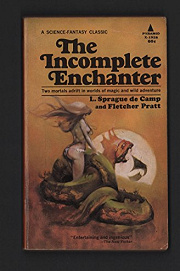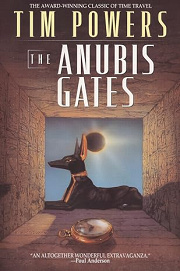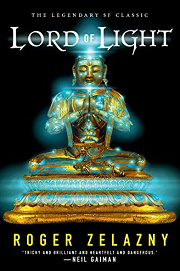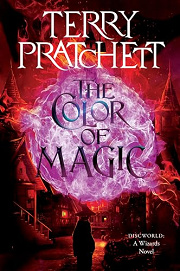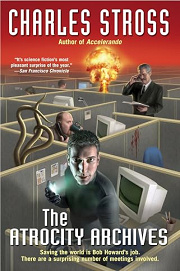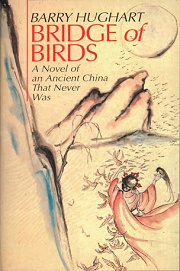Share your thoughts in a quick Shelf Talk!
The Incomplete Enchanter by L. Sprague de Camp
A skeptical psychologist stumbles into realms where myth is physics and logic can bend reality itself. As experiments turn into odysseys, he must navigate sagas come to life and riddles that think back. Witty, inventive, and full of classical twists, The Incomplete Enchanter is a portal fantasy that plays with folklore as cleverly as it honors it.
Have you read this book? Share what you liked (or didn’t), and we’ll use your answers to recommend your next favorite read!
Love The Incomplete Enchanter but not sure what to read next?
These picks are popular with readers who enjoyed this book. Complete a quick Shelf Talk to get recommendations made just for you! Warning: possible spoilers for The Incomplete Enchanter below.
In The Incomplete Enchanter, did you enjoy ...
... a bemused scholar flung through a misfiring passage into perilous, rule-twisting otherworlds?
The Anubis Gates by Tim Powers
If you loved watching Harold Shea use symbolic logic to blunder from Norse sagas to Spenser’s court (and woo Belphebe) only to find himself hilariously out of his depth, you’ll relish how The Anubis Gates hurls linguist Brendan Doyle through a magical gateway into 1810 London. The book blends witty fish‑out‑of‑water scrapes with intricate occult mechanics—Egyptian sorcery, time‑loops, and body‑stealing villains—capturing that same heady mix of portal mishap, ingenuity, and swashbuckling close calls you enjoyed in The Incomplete Enchanter.
... clever, irreverent adventures that rework mythic pantheons into a fresh battleground?
Lord of Light by Roger Zelazny
You liked how Harold Shea crashed into living myth—from Valhalla to the pages of The Faerie Queene—and had to outthink gods and heroes with wit and logic. In Lord of Light, Zelazny recasts Hindu and Buddhist deities as ultra‑advanced humans ruling a colony world, while the trickster‑hero Sam (Mahasamatman) wages a sly, idea‑driven war against the "gods." The audacious remix of mythology, sparkling banter, and cerebral gambits echoes Shea’s brain‑over‑brawn scrapes—only here the stakes span an entire civilization.
... cheeky, trope‑savvy romps where every quest doubles as a send‑up of fantasy itself?
The Colour of Magic by Terry Pratchett
If Harold Shea’s comic misadventures—miscast spells, literal‑minded heroes, and literary worlds skewered with a grin—made you laugh, The Colour of Magic will hit the same sweet spot. Hapless wizard Rincewind and tourist Twoflower careen across Discworld as satire and spectacle collide—the Luggage rampages, dragons are powered by belief, and every epic turns delightfully sideways. It’s that same blend of playful cleverness and genre in‑jokes that made Shea’s jaunts through Spenser and the sagas such a hoot.
... rule‑bound, pseudo‑scientific sorcery where math and method open dangerous doors?
The Atrocity Archives by Charles Stross
Harold Shea’s symbolic‑logic spellwork gave you a kick—equations as keys to other realities. In The Atrocity Archives, Bob Howard practices computational demonology for a secret British agency, where the right algorithm can summon things that should stay uninvited. The procedural, systems‑savvy magic, deadpan humor, and bureaucratic chaos echo Shea’s rational tinkering with the uncanny—only with IT tickets, eldritch audits, and world‑ending edge cases in the mix.
... a wondrous, folkloric quest that dazzles with discoveries, puzzles, and heart?
Bridge of Birds by Barry Hughart
If the wide‑eyed delight of stepping from Gloriana’s court to Valhalla—discovering rules of each realm on the fly—hooked you, Bridge of Birds offers that same sense of exuberant discovery. Number Ten Ox and the irrepressibly brilliant Master Li (“with a slight flaw in his character”) chase cures, legends, and riddles across an enchanted, myth‑touched China. Like Shea’s quick‑witted fixes to magical quandaries, each revelation unfolds with warmth, wit, and a cascade of marvelous surprises.
Unlock your personalized book recommendations! Just take a quick Shelf Talk for The Incomplete Enchanter by L. Sprague de Camp. It’s only a few questions and takes less than a minute.
